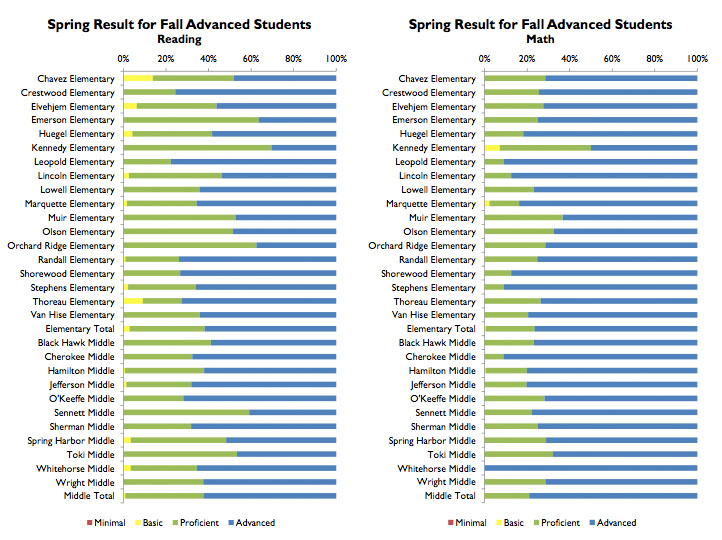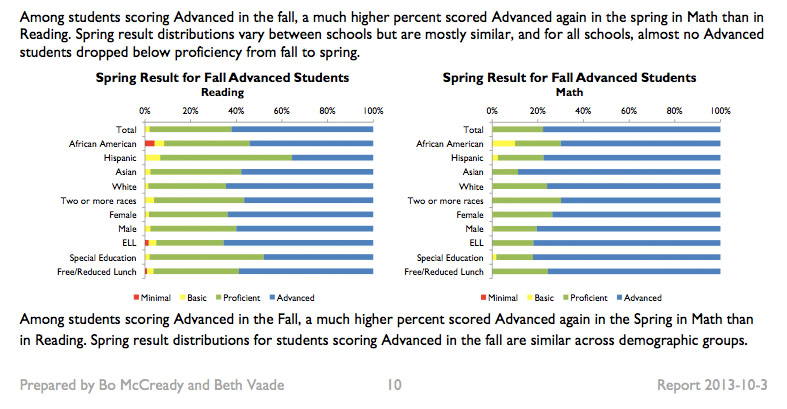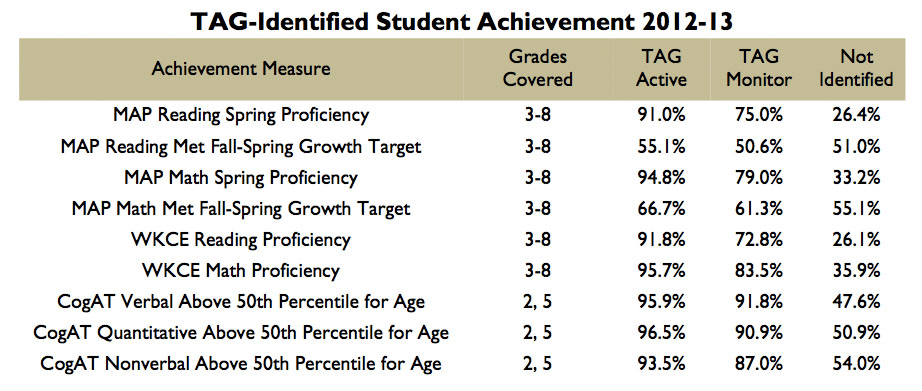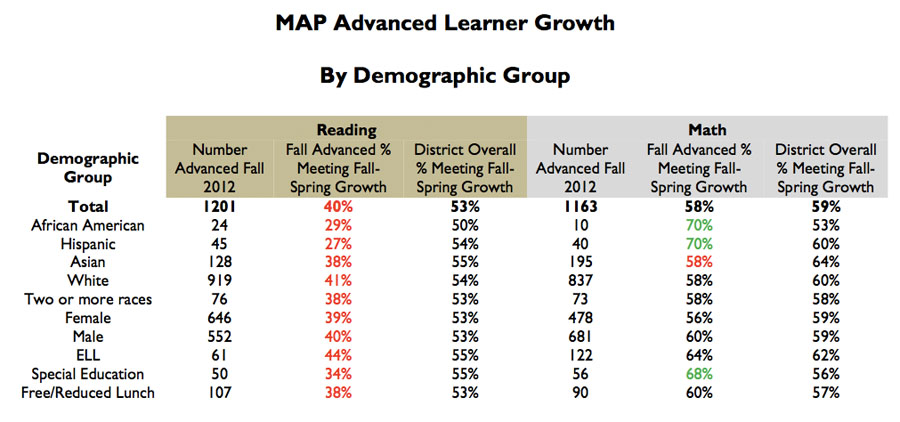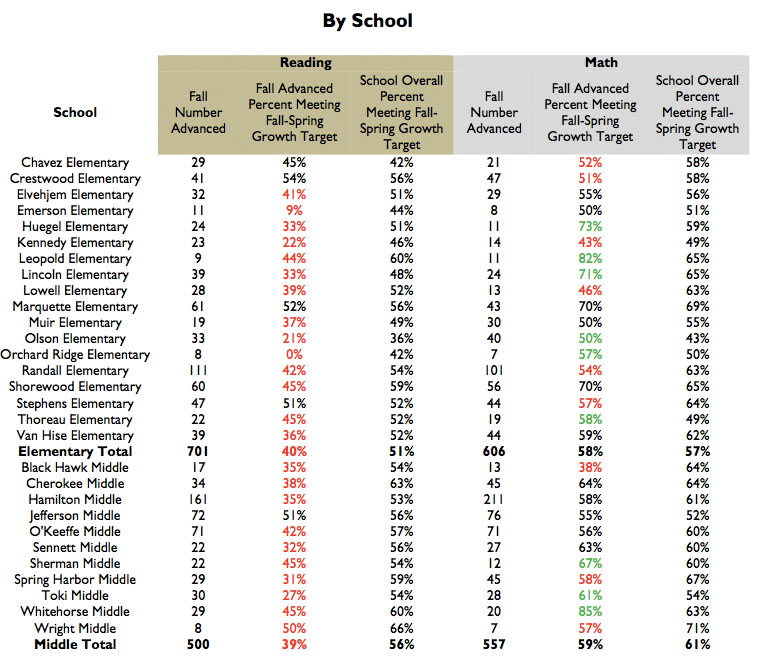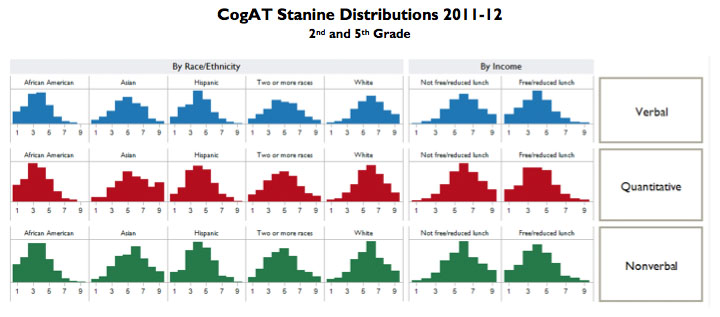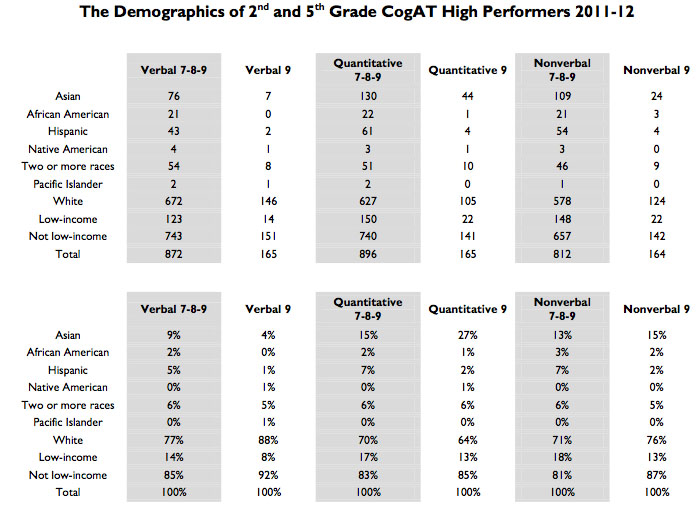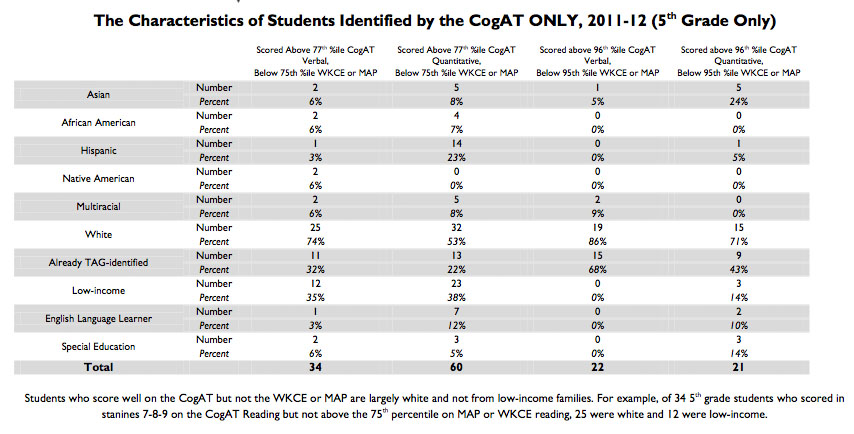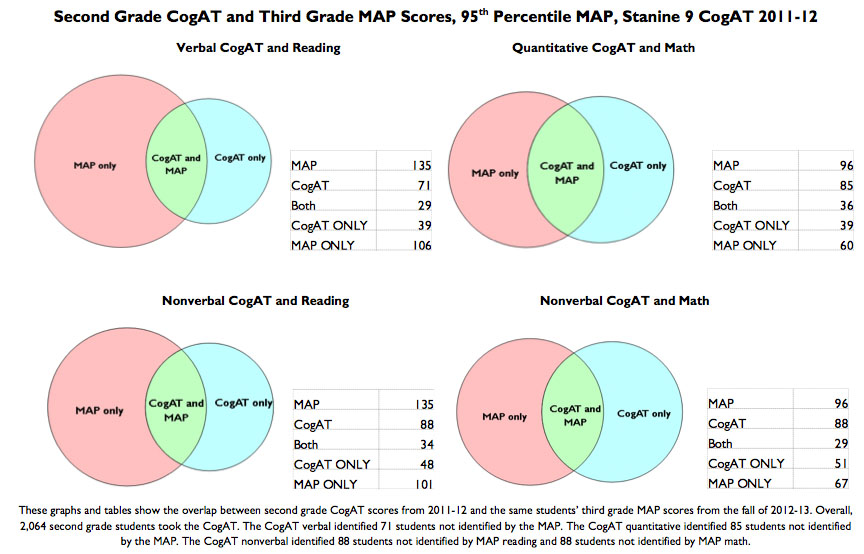Search Results for: "Talented & Gifted" complaint
Madison Schools Found Non-Compliant on Wisconsin DPI Talented & Gifted Complaint
Madison School District 450K PDF and the DPI Preliminary Audit, via a kind reader’s email:
I. Introduction A.Title/topic-Talented and Gifted Compliance
B. Presenter/contact person -Sue Abplanalp, Jennifer Allen, Pam Nash and Dylan Pauly
Background information- On March 24,2011, MMSD received DPI’s initial findings in the matter ofthe TAG complaint. DPI found MMSD to be noncompliant on all four counts. The Board has forty-five days from the date of receipt ofthe initial findings to petition the state superintendent for a public hearing. If the Board does not request such a hearing, the findings will become final. Once the findings are final, regardless of whether a hearing is held, if there is a finding of noncompliance, the state superintendent may develop with the Board a plan for compliance. The plan must contain a time line for achievement of compliance that cannot exceed ninety days. An extension of the time period may be requested if extenuating or mitigating circumstances exist.
II. Summary of Current Information:
Current Status: Currently, DPI has made an initial finding of noncompliance against MMSD. While the Board is entitled to request a public hearing on the issue of compliance, the administration does not recommend this course of action. Consequently, at this time, the administration is working toward the development ofa response to DPI’s findings, which will focus on remedial steps to insure compliance.
Proposal: Staff are working on a response to the preliminary findings which we will present to the Board when completed. It is the administration’s hope that this response will serve as the foundation to the compliance plan that will be developed once the DPI findings are final. The response will include input from the TAG Advisory Committee, the District’s TAG professionals — our Coordinator and staff. A meeting to begin work one the proposed response is currently scheduled for April28, 2011 from 4:00 p.m.-5:00pm. Subsequent meetings will follow.Much more on the Wisconsin DPI Parent Talented & Gifted complaint.
Watch Monday evening’s Madison School Board discussion of the DPI Talented & Gifted complaint, here (starts at 128:37). and here.
Madison School District’s Talented & Gifted Plan 3 Pager (TAG)
Madison School District (205K PDF):
The BOARD is committed to providing a strong instructional program that results in student growth for all students, including advanced learners. The BOARD recognizes that many advanced learners have unique academic and social-emotional needs that may require additional supports or interventions beyond the strong core instruction that is provided within a general education classroom if they are to achieve growth in their identified domain(s). The BOARD further recognizes the need to create systems for identifying, monitoring and serving advanced learners that are culturally responsive and sensitive to the needs and experiences of students with the potential for high performance but who are underperforming and students from underrepresented groups. The BOARD is committed to engaging the parents and guardians of advanced learners through outreach to, communication with and the inclusion of parents and guardians in education decisions that affect their students. In order to actualize these commitments for all students, all schools must, through professional collaboration and with the input from parents and guardians, appropriately identify and serve all advanced learners, including students from underrepresented groups, students who evidence high potential but are underperforming and twice exceptional learners, using the identification, monitoring and intervention systems set forth in the BOARD-approved Talented and Gifted Plan.
A. Differentiated Instruction – A best practice for all instructional staff across all grade levels and subjects that involves modifying the classroom curriculum, instructional model and/or expected evidence of learning to meet unique student needs within the classroom.
B. Advanced Learner – A student who demonstrates high performance capability or the potential for high performance in one or more of the following domains and requires enrichment and/or intervention beyond differentiated core instruction. The domains are general intellectual, creativity, specific academic, leadership and visual and performing arts.
C. Interventions – Research-based instructional practices and programs used systematically to provide support to students who exceed academic or behavioral benchmarks or who evidence high potential but have not yet demonstrated high performance. Interventions, which are provided in addition to or in replacement of differentiated, grade-level core instruction, are used to systematically provide an enhanced opportunity to learn, scaffold learning for students whose mastery of skills or content are below what is expected and/or provide a faster pace of learning.Much more on the talented & gifted program, here and a parental complaint.
Madison Talented & Gifted Update & Interesting MAP Test Results, By School
Reminders of Best Practice
Current Practice
Data from MMSD
Review input from Focus Groups
Examine Implications for Policy
Examine Implications for PracticeRelated: Parent talented & gifted complaint, MAP Assessment results, English 10, credit for non-Madison school district courses and outbound open enrollment.
Madison School District Talented & Gifted Report: An interesting change from a few years ago; 41 students out of 1877 were newly identified for TAG talent development by the CogA T nonverbal.
Superintendent Jane Belmore (652K PDF):
This information is provided in response to a request for more information made at the January 28th Regular Board of Education meeting regarding the implication of CogAT for the 2012-13 school year. Communication with DPI TAG consultant has occurred on numerous occasions. A Review Committee, with additional members, met twice since January 28 and a survey of options was developed and distributed to the Assessment Review Committee and elementary and middle school principals. Results from this survey, in addition to previous Review Committee information, were used to develop the recommendation.
The BOE requested a report on CogAT which is attached to this memo.A few charts from the report:
Much more on the 2010 parent complaint on Madison’s “Talented & Gifted” program, here. The move to more one size fits all classes, such as English 10 a few years ago, reduced curricular options for all students. East High School “Redesign” halted.
An Update on the Parent Complaint of Madison’s Talent & Gifted Program, and the Wisconsin DPI’s Repsonse
But because the district has made significant progress and expects to make further improvements to its program, it won’t face any penalties at this time, DPI spokesman Patrick Gasper said.
Parents who filed a complaint with the DPI about Madison’s TAG program in September 2010, and wrote the DPI another letter last fall about shortcomings in the district’s middle school offerings, were pleased with the results of the latest audit.
“The preliminary report achieves a good balance of recognizing effort without losing sight of continued weaknesses,” parent Laurie Frost said in an email. “I am happy the district was found to be in only partial compliance, but also very glad the DPI did not levy any financial penalty.”
The DPI determined the district’s program was deficient in 2011, but agreed to an Aug. 22, 2012, compliance deadline. The School Board adopted a TAG plan and hired a program administrator in 2011.Much more on the 2010 parent complaint on Madison’s “Talented & Gifted” program, here. The move to more one size fits all classes, such as English 10, reduced curricular options for all students.
Madison’s Talented & Gifted Plan Revisions
Interim Superintendent Jane Belmore:
The initial TAG Plan, created by a variety of stakeholders including teachers, administrators, parents, and community members was approved by the Board of Education on August 27, 2009, and revised and approved on December 13, 2010. The Department of Public Instruction determined that the MMSD TAG Department was out of compliance at the end of May 2011. In June 2011, the current coordinator assumed duties and a new TAG Plan was written to address issues of noncompliance; the plan was approved by the BOE on August 8, 2011. An extension of one year was granted to MMSD to become compliant. The TAG End-of-Year document uses the framework of the original plan and incorporates information that addresses compliance issues as outlined in the 2011 TAG Plan. DPI has indicated that the audit will take place in the last half of September, 2012.
In the letter to Mr. Howard (August 14, 2012), DPI requested additional documentation be submitted to the DPI no later than September 7. The TAG Plan is a major piece of this documentation.Related: Notes and links on the parent talented & gifted complaint.
Madison Schools To Start New Talented & Gifted Program
Spurred by a critical state audit, the Madison School District will begin a new program this year intended to better identify and provide services for talented and gifted students.
Using an approach similar to how it identifies and serves special education students, the district plans to categorize talented-and-gifted services into three tiers and identify where all students fit into those tiers based on a combination of test scores, grades, teacher and staff assessments, and parent and self-identification.
Students who qualify for the top tier could receive additional academic services outside of the classroom. The program also seeks to develop the potential talent of all students, especially those who may not have been identified in the past, such as English language learners and low-income students.
In the past, Madison schools have used a more ad hoc, less systematic, approach for identifying and serving students who demonstrate advanced abilities in intellect, academics, leadership, creativity, and the performance and visual arts. The district also has historically blanched at grouping students by ability.Related: A group of Madison parents filed a successful complaint related to talented & gifted services with Wisconsin’s Department of Public Instruction.
Madison School District Talented & Gifted Program Update
During the 2011-2012 school year, as MMSD implements Response to Instruction and Intervention (RTI2) and the new district School Support Teams, the plan for delivery of Talented and Gifted Services will continue to be integrated and refined so that it accomplishes the following: 1) is both systemic and systematic in nature; 2) is collaborative; 3) is financially sustainable; 4) is fluid and responsive to student needs; S) offers appropriate opportunities for student growth and talent development; 6) addresses the comprehensive needs (academic, social and personal growth) of students; 7) is aligned with State regulations, professional standards, current research, and effective practice; and 8) provides goals and evaluation procedures to evaluate growth and suggest areas in which change is needed. This Plan for TAG Services describes the following:
Much more on the recent complaint regarding the Madison School District’s Talent & Gifted Update, here.
Madison’s Lake Wobegon schools?
Nearly 30 percent of the students at Madison’s Marquette Elementary School were classified last year as “talented and gifted,” or TAG, according to the school district.
That may not be Lake Wobegon territory — where “all the children are above average” — but it’s still pretty hard to believe.
Such alleged widespread student giftedness isn’t just the case at one district school.
Yes, there are wide variations among Madison elementary and middle schools in percentage of TAG students, but figures from the district suggest that on average districtwide, there are about twice as many TAG students as one would expect given national averages and expert opinion.
The National Association for Gifted Children estimates that about 6 percent of American school children are gifted.
The federal government’s National Center for Education Statistics put the gifted and talented number at 6.7 percent as of 2006, the most recent year for which data are available.Much more on “talented & gifted” programs, here, including a recent parent group complaint.
Even Gifted Students Can’t Keep Up In Math and Science, the Best Fend for Themselves
NY Times Editorial, via a kind reader:
“Federal, state and local governments and school districts have put little effort into identifying and developing students of all racial and economic backgrounds, both in terms of intelligence and the sheer grit needed to succeed. There are an estimated three million gifted children in K-12in the United States, about 6 percent of the student population. Some schools have a challenging curriculum for them, but most do not.”
…..
In a post-smokestack age, there is only one way for the United States to avoid a declining standard of living, and that is through innovation. Advancements in science and engineering have extended life, employed millions and accounted for more than half of American economic growth since World War II, but they are slowing. The nation has to enlarge its pool of the best and brightest science and math students and encourage them to pursue careers that will keep the country competitive.
But that isn’t happening. Not only do average American students perform poorly compared with those in other countries, but so do the best students, languishing in the middle of the pack as measured by the two leading tests used in international comparisons.
On the 2012 Program for International Student Assessment test, the most recent, 34 of 65 countries and school systems had a higher percentage of 15-year-olds scoring at the advanced levels in mathematics than the United States did. The Netherlands, Belgium and Switzerland all had at least twice the proportion of mathematically advanced students as the United States, and many Asian countries had far more than that.
Other tests have shown that America’s younger students fare better in global comparisons than its older students do, which suggests a disturbing failure of educators to nurture good students as they progress to higher grades. Over all, the United States is largely holding still while foreign competitors are improving rapidly.
Federal, state and local governments and school districts have put little effort into identifying and developing students of all racial and economic backgrounds, both in terms of intelligence and the sheer grit needed to succeed. There are an estimated three million gifted children in K-12 in the United States, about 6 percent of the student population. Some schools have a challenging curriculum for them, but most do not.Related: parents file talented & gifted complaint with the Madison School District.
TAG Best Practices
#1: Good teaching needs to be seen as including those students who are already grade-level proficient
– Lesson plans (coherent instruction) – Curricular alignment
– Accountability
#2 Needs-Based Learning
• What a student is learning should be based on his or her current level of mastery
• This may or may not correspond with age-level normsThis would seem to make sense for all students.
Related: Some states begin to add teacher content knowledge requirements to the licensing process.
Much more on Madison’s Talented & Gifted program along with a recent parent complaint.
Do We Still Segregate Students? Schools around the nation are ‘detracking’ classes, putting kids of all achievement levels in the same room. Does that sabotage higher achievers?
WHEN ERIC WITHERSPOON became superintendent of Evanston Township High School (www site) near Chicago in 2006, he walked into a math class where all the students were black. “A young man leaned over to me and said, ‘This is the dummy class.'”
The kids at Evanston who took honors classes were primarily white; those in the less demanding classes were minority–a pattern repeated, still, almost 60 years after integration, across the nation. All of the Evanston kids had been tracked into their classes based on how they’d performed on a test they took in eighth grade.
Last September, for the first time, most incoming freshmen, ranging from those reading at grade level to those reading far above it, were sitting together in rigorous humanities classes. When I visited, students of all abilities and backgrounds met in small groups to discuss one of the required readings, which include A Raisin in the Sun and The Odyssey. This September, most freshmen will sit side-by-side in biology classes.
Mindy Wallis, the mother of a sophomore at Evanston Township High, agrees. She opposed the decision to detrack, and spearheaded a petition that advocated waiting for the results of a three-year evaluation before making changes that so substantively affected the freshman class. Angela Allyn, whose 14-year-old son just took a freshman humanities class, says her son was hungry to read more than two-thirds of The Odyssey, which was all the class required. He was encouraged by his teachers to read the entire book, but Allyn says the teachers didn’t help him navigate difficult portions during class, so she had to work with him into the late hours of the night. Her son was teased by classmates, she says, for “showing off and using big words,” something she believes wouldn’t have occurred if he’d been grouped with a similar cohort. Detracking, she contends, focuses “on bringing the bottom up–and there’s an assumption that our bright children will take care of themselves.” She acknowledges that because she’s seen as having “white privilege,” despite the fact that she put herself through school and even occasionally had to use soup kitchens to get by, she’s perceived as racist by merely making such a comment.
Adam Gamoran, director of the Wisconsin Center for Education Research, also believes that race is part of the debate: “People who support tracking are more interested in productivity and less concerned about inequality, and people who are critics tend to focus on inequality and don’t spend too much time thinking about productivity.” Gamoran argues that schools that want to keep ability-grouping need to do a better job with the students in the lowest tracks, but he also believes that the most capable students may not always be sufficiently challenged in mixed-ability classes. “There’s no single solution,” he says. “The point is to try to address the limitations of whatever approach is selected.”Links:
- English 10
- Small Learning Communities
- Evanston will spend $75,200,000 for 2,974 students, or $25,285/student (!) Madison will spend $15,132/student during the 2012-2013 budget year.
- Adam Gamoran notes and links.
- Madison parents’ Talented & Gifted complaint.
ACT Scores Decline Somewhat in Madison, Wisconsin Slightly Up, 32% of Badger Students “Ready” for College Level Courses in 4 Areas
The average ACT score among the Madison School District’s 2011 graduates dipped to its lowest level in 15 years, while the gap between white and minority student scores shrank for the first time in five years.
Though Madison’s average score dipped from 24.2 to 23.9, district students still outperformed the state average of 22.2 and national average of 21.1. A perfect score on the college entrance exam is 36.
Madison’s average scores in recent years have ranged from 23.5 in 1995 to 24.6 in 2007. The average score was also 23.9 in 2003.With the highest percent of students taking the ACT in state history, Wisconsin’s Class of 2011 posted an average score slightly above that from the previous year’s graduates and maintained the state’s third-place ranking among states in which the test is widespread.
Seventy-one percent of the 2011 graduates from Wisconsin private and public schools took the college admissions test, averaging a 22.2 composite score on the 36-point test, according to information to be publicly released Wednesday. The nationwide average was 21.1 on the ACT Assessment, which includes tests in English, reading, mathematics and science.
State schools superintendent Tony Evers credited the results to more high school students pursuing more demanding coursework.
“The message of using high school as preparation for college and careers is taking hold with our students,” Evers said in a news release. “Nearly three-quarters of our kids said they took the rigorous classes recommended for college entry, up from just over half five years ago.”
Even so, ACT reported that only 32% of Wisconsin’s recently graduated seniors had test results that showed they were ready for college-level courses in all four areas. Results for individual subjects ranged from 39% readiness in science to 75% in English.A few somewhat related links:
When all third graders read at grade level or beyond by the end of the year, the achievement gap will be closed…and not before.
On November 7 (2005), Superintendent Art Rainwater made his annual report to the Board of Education on progress toward meeting the district’s student achievement goal in reading. As he did last fall, the superintendent made some interesting claims about the district’s success in closing the academic achievement gap “based on race”.
According to Mr. Rainwater, the place to look for evidence of a closing achievement gap is the comparison of the percentage of African American third graders who score at the lowest level of performance on statewide tests and the percentage of other racial groups scoring at that level. He says that, after accounting for income differences, there is no gap associated with race at the lowest level of achievement in reading. He made the same claim last year, telling the Wisconsin State Journal on September 24, 2004, “for those kids for whom an ability to read would prevent them from being successful, we’ve reduced that percentage very substantially, and basically, for all practical purposes, closed the gap”. Last Monday, he stated that the gap between percentages scoring at the lowest level “is the original gap” that the board set out to close.
Unfortunately, that is not the achievement gap that the board aimed to close.“Penelope Trunk”: (Adrienne Roston, Adrienne Greenheart(
10. Homeschool. Your kids will be screwed if you don't.
The world will not look kindly on people who put their kids into public school. We all know that learning is best when it's customized to the child and we all know that public schools are not able to do that effectively. And the truly game-changing private schools cost $40,000 a year.Notes and links on the recent, successful Madison Talented & Gifted parent complaint.
Would improved TAG program hurt other Madison School District Programs?
Just when you thought the Madison School District had enough on its plate — perennially tight budgets, teachers incensed at Gov. Scott Walker’s union-busting, minority achievement gaps — it’s under a gun of a different sort:
Get your program for talented and gifted, or TAG, students in order, the state told the district in March, after a group of parents complained their kids were not being sufficiently challenged in the classroom.
I am dubious of efforts to devote additional time and money to students who already have the advantage of being smart — and often white and upper-middle class — and who have similarly situated parents adept at lobbying school officials.
Money, time and effort generally not being unlimited commodities in public school districts, the question over what is to be done about Madison’s TAG program strikes me as one of priorities.
Improving TAG offerings would seem to require an equal reduction in something else. And maybe that something else is more important to more students.
Not that it’s likely anyone on the School Board would ever acknowledge any trade-offs.
It’s a “false dichotomy,” said School Board member Ed Hughes, and “not an either/or situation.” Can the district be all things to all people? I asked. “Sure,” he said. “Why not?”Much more on the Talented & Gifted Wisconsin DPI complaint, here.
State investigation finds problems with Madison talented and gifted program
The Madison School District is under added pressure to improve how it identifies and educates talented and gifted students after state officials found its program does not comply with state law.
In revealing shortcomings in the district’s offerings for talented and gifted (TAG) students, the Department of Public Instruction challenges the approach some schools, particularly West High School, have used in which all students learn together.
“The district is going to have to face (the question): ‘How do they reconcile their policy of inclusion with honors classes?’?” said Carole Trone, director of the Wisconsin Center for Academically Talented Youth at UW-Madison. “If parents see the other districts are challenging their students more, they might send their students there.”
Developing a comprehensive system to identify TAG students — including testing and staff training — can be expensive, Trone said. Moreover, districts that don’t identify students from all socioeconomic and cultural backgrounds open themselves up to discrimination lawsuits, she said.
Superintendent Dan Nerad said it’s unclear how much such a revamped program will cost.Much more on the talented & gifted complaint, here.
